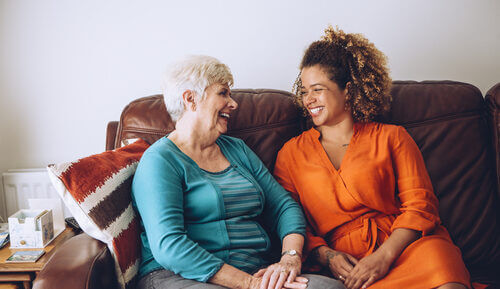
Page contents
- What is sexually inappropriate behaviour in someone with dementia?
- What causes sexually inappropriate behaviour in people with dementia?
- 12 tips to tackle dementia and inappropriate sexual behaviour
- Consequences of inappropriate sexual behaviour
- How do I know if someone with dementia is being sexually abused?
- What should I do if my partner’s sexual appetite changes?
- What support can I get if a loved one with dementia displays sexually inappropriate behaviour?
Page contents
- What is sexually inappropriate behaviour in someone with dementia?
- What causes sexually inappropriate behaviour in people with dementia?
- 12 tips to tackle dementia and inappropriate sexual behaviour
- Consequences of inappropriate sexual behaviour
- How do I know if someone with dementia is being sexually abused?
- What should I do if my partner’s sexual appetite changes?
- What support can I get if a loved one with dementia displays sexually inappropriate behaviour?
If your family member or partner has dementia, they may display sexually inappropriate behaviour towards you or others. This can be quite alarming and challenging. Here are some tips on how to tackle changes in sexual behaviour from someone with dementia.
What is sexually inappropriate behaviour in someone with dementia?
While you may feel more ready to respond to symptoms of dementia such as loss of memory or hallucinations, you may not know what to do, when faced with sexual advances, a change in sexual interests or behaviour.
A person with dementia can act in a sexual way toward their partner, children, professional care staff or others. Family and others can feel embarrassed, uncomfortable and even scared when faced with inappropriate sexual behaviour.
Sexually inappropriate behaviour from someone with dementia includes:
- Sexual acts. This includes touching or grabbing themselves, exposing themselves or masturbating publicly. It also includes grabbing others.
- Lewd, sexual comments.
A person with dementia can experience:
- Increased or reduced sexual appetite or no appetite for sex.
- Greater, diminished or no ability to perform sexually.
- A change in sexual responses, e.g. detached, less sensitive to partner’s needs.
- Change in level of inhibitions e.g. doing or saying things they would not normally do.
- Being sexually aggressive.
What causes sexually inappropriate behaviour in people with dementia?
As a person’s dementia develops, they might experience changes in their behaviour. They may not be able to control their behaviour, what they say or be able to communicate how they feel effectively. The individual may be unaware that they are doing something inappropriate or that their behaviour has changed.
A change in behaviour is caused by damage in the brain. Dementia affects parts of the brain that control a person’s ability to control their own responses. The brain controls all behaviour and emotions, including sexual feelings and inhibitions. Someone with dementia may have increased or reduced sexual feelings. Some types of dementia can cause a loss of inhibitions.
- Someone with dementia may be confused about who you or someone else is and think that you or someone else is their partner. Check out this article on how to cope when someone with dementia doesn’t recognise you.
- Someone with dementia may forget they have a partner and as a result get intimate with someone else.
- They may be trying to express something. It could be that they are in pain, discomfort or emotional distress. Trying to undress or touching their own genitals could indicate that the individual with dementia needs the toilet or is uncomfortable, e.g. too hot, rather than a sexual act.
- They may take off their clothes or masturbate in public. This could be caused by not knowing they’re not in a private place.
- They may misinterpret actions e.g. a carer giving personal care could be confused with sexual intimacy.
- The person with dementia may feel lonely. They may want to feel intimacy again, closeness, comfort.
- They could be bored.
12 tips to tackle dementia and inappropriate sexual behaviour
It is important that people living with dementia receive care but it is also important that any sexual behaviour in someone with dementia is tackled appropriately.
Here are 12 top tips to tackle inappropriate sexual behaviour.
- Tell the person such behaviour is inappropriate and not wanted. Calmly and consistently call out inappropriate sexual behaviour. Say “No, stop. That’s not right.” Some people with dementia may understand nonverbal cues better than verbal communication. When you say “No”, look serious and shake your head to let them know their behaviour is not acceptable.
- If they have confused you or someone else with their partner (e.g. confused a family member with a deceased wife), remind the person who you or the other person is.
- If they are publicly displaying sexually inappropriate behaviour, e.g. touching people or exposing themselves, take them somewhere quieter, less crowded to remove them from what may be triggering their behaviour.
- When you are with them, make sure there is enough space between them and others so that they cannot touch them inappropriately.
- Distract and redirect them. To distract, take the individual to another area, ask a question, show them flowers in the garden or offer them something to eat. To redirect them, turn on music they like, go for a walk or do another activity they like.
- If giving personal care, tell them what you are doing before you do it. e.g. ‘I am going to help you remove your clothes to have a shower’.
- Boredom can cause sexual behaviour. Keep the person busy with varied activities.
- Keep their hands active with a fidget/sensory aids.
- Offer ‘cuddle substitutes’ e.g. a dementia doll or soft toy.
- To prevent undressing, you can get clothing that makes it hard for the wearer to take off their clothes. e.g. buttons fasten at the back.
- Record all inappropriate behaviour to try to identify triggers.
- If the person is being sexually abusive/aggressive and you feel you are in danger, remove yourself from harm and call 999.
Consequences of inappropriate sexual behaviour
- Care workers may not feel safe caring for the individual.
- The person’s partner, family members, friends may feel at risk of sexual violence.
- People may avoid spending time with them, this could make the person with dementia feel isolated and lonely.
- The person with dementia may not understand that their partner is not consenting to sex and may get angry if rejected.
- The individual could be detained in police custody or sectioned under the Mental Health Act.
How do I know if someone with dementia is being sexually abused?
- Sexual abuse includes violence, force or making a person do something they don’t want to such as watching pornography.
- If you suspect sexual abuse, you must consider if the person has the mental capacity to be give consent, is not being taken advantage of, feels comfortable in the relationship and is behaving in a way that is aligned to what they believe in.
What should I do if my partner’s sexual appetite changes?
- If someone seems less interested in sexual intimacy with their partner or being around them or if they show sexual interest in other people this can be frustrating for their partner. The partner could try to feel close to them in other ways but ultimately they must respect the person’s wishes if they do not consent to being intimate and having sexual relations. Consent for sexual activity must come from both parties.
- You can adapt your relationship. Sexual desires and drives might change for both of you. You can still make the person feel valued and give physical attention through activities like hugging while watching TV or dancing together.
- If sexual relations or intimacy is no longer what you or your partner want, consider separate sleeping arrangements.
A man whose wife has dementia shared on Alzheimer’s Society website: “I concluded that my wife wasn’t able to consent to sexual activity several years ago and stopped out of respect for her.
“Physical manifestations of affection such as cuddling and kissing remain important as a means of communication between us, but in a way that is not sexual and only if she seems happy and does not object.”
What support can I get if a loved one with dementia displays sexually inappropriate behaviour?
- Talk to a health or social care professional.
– A doctor, nurse or care manager may be able to unearth the trigger behind
the behaviour.
- If you decide your loved one should move into a care home:
– Ask about the care home’s policy on sexual relationships, intimacy and inappropriate sexual behaviour.
– Find out how the care home determines a person with dementia’s ability to give meaningful consent to sex.
- Talk to family or friends
– Consider talking with a family member or friend. They can offer you emotional support. Let family, friends know that inappropriate behaviour might happen and that it’s caused by the damage to their brain from dementia.
- Helplines
-You’re not alone in dealing with these issues. Find a support group of people who are going through similar experiences to you.
-You can also seek help and advice by contacting Admiral Nurse Dementia Helpline on 0800 888 6678 or Alzheimer’s Society on 0333 150 3456.


